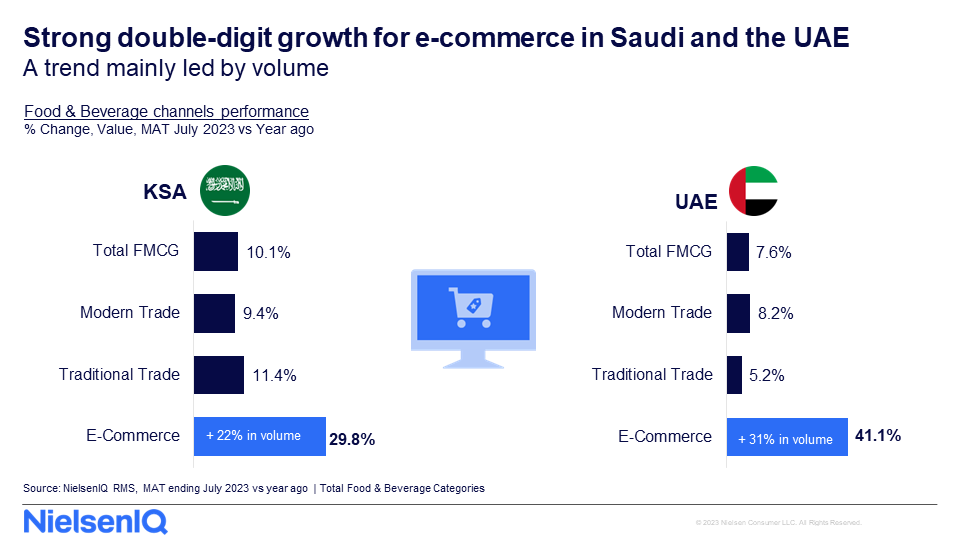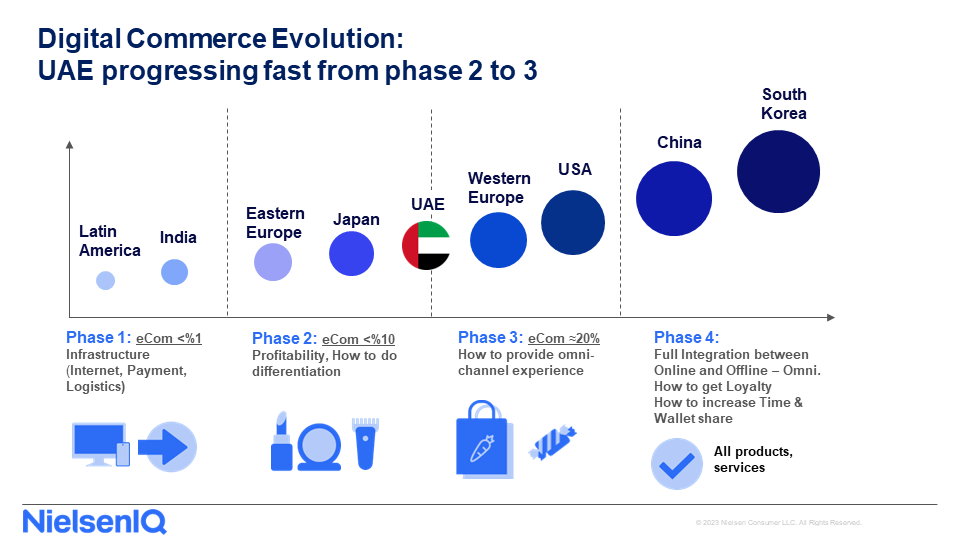Amid the constraints of the current global inflationary environment, food and beverage sales continue to show value growth across every channel over the last 12 months. Amidst this altered shopping environment one channel that has achieved a standout performance within the retail markets of the Kingdom of Saudi Arabia (KSA) and the United Arab Emirates (UAE) is e-commerce.

NielsenIQ
Despite facing significant price hikes averaging 3% and 5%, respectively, over the past three months, both nations have again recorded strong e-commerce growth rates of 17% and 24%.
Growth and Opportunities
The UAE has witnessed the highest value growth in the snacking category, while in KSA, the personal care segment takes the lead. This resilience and adaptability of e-commerce underscores its enduring appeal and versatility in the face of economic challenges.
These insights stem from the latest NielsenIQ analysis of the region's key Fast Moving Consumer Goods (FMCG) data up to the end of August 2023. The study reveals intriguing developments in Saudi Arabia (KSA) and the United Arab Emirates (UAE) markets, reflecting both challenges and opportunities for businesses operating in the region.
Speaking at the recent Future Food Forumin Dubai NielsenIQ GM Arabian Peninsula & Pakistan Andrey Dvoychenkov underlined the online journey he has observed in the region and stressed, "e-commerce in the UAE is jumping from one phase of its development to the next… without even looking back."

Image Source: NielsenIQ
Modern Trade Sector Under Pressure
In contrast to the e-commerce sector's performance, the Modern Trade (MT) sector has shown signs of gradual deceleration, indicative of a growing sense of price sensitivity among consumers.
In Saudi, a substantial 69% of categories in Modern Trade have witnessed an average price increase in the last 3 months vs last year, while this number is even higher at 78% in the UAE. This means that even if inflation continues to slow down in both markets, consumers are feeling the impact of rising prices across a wide range of products.
One of the most notable trends in this period is the decline in consumption, as volumes are declining by –0.4% in Saudi and –0.7% in the UAE. But in this inflationary environment, consumers are also willing to pay more for the attributes that matter to them. Their interest focuses on products made of natural/organic ingredients which also provide a balance between health benefits and taste.
Promotions and Private Label on the Rise
Despite the challenges posed by rising prices, promotions remain a significant factor in the region, with the latest NielsenIQ Barometer Report highlighting that Temporary Price Discounts (TPR) still dominate promotions.
In the UAE, promotions accounted for 33.5% of the total FMCG value in July 2023, but showed a lower overall weighting in overall sales, pointing to potential shifts in consumer behaviour. Promotion efficiency in the UAE is still a concern, highlighting the need for more effective marketing strategies.
In Saudi, promotions accounted for 40% of the total FMCG value sold in July 2023, indicating a continued reliance on discounts to drive sales. According to the latest NielsenIQ Mid-year Consumer Outlook 2023 survey, 97% of Saudi consumers have changed the way they shop for FMCG (versus 95% globally). This has seen them adopting a range of strategies to manage their spending. The three top consumer saving strategies are buying whichever brand is on promotion (29%), shopping more often at discounters (32%), and focusing on essentials (26%).
The analysis also highlighted the staying power of private labels in KSA where many consumers are managing costs by turning to store brands. More than a third of consumers think store brands usually are good value for money while 30% consider them a viable alternative to name brands.




